Hyundai Santa Fe vs VW Transporter Transporter – Differences & prices compared
Compare performance, boot space, consumption and price in one view.
Find out now: which car is the better choice for you – Hyundai Santa Fe or VW Transporter Transporter?
The Hyundai Santa Fe (SUV) comes with a Full Hybrid or Plugin Hybrid engine and Automatic transmission. In comparison, the VW Transporter Transporter (Cargo Van) features a Diesel, Plugin Hybrid or Electric engine with Manuel or Automatic transmission.
When it comes to boot capacity, the Hyundai Santa Fe offers 711 L, while the VW Transporter Transporter provides – depending on how much space you need. If you’re looking for more power, decide whether the 253 HP of the Hyundai Santa Fe or the 286 HP of the VW Transporter Transporter suits your needs better.
In terms of consumption, the values are 1.70 L per 100 km for the Hyundai Santa Fe, and 21.90 kWh7.10 L for the VW Transporter Transporter.
Price-wise, the Hyundai Santa Fe starts at 49000 £, while the VW Transporter Transporter is available from 37500 £. Compare all the details and find out which model fits your lifestyle best!
Hyundai Santa Fe
The Hyundai Santa Fe offers a refined blend of style and functionality, making it a strong contender in the SUV market. Its modern interior, combined with advanced technology and comfort features, creates an inviting and practical driving environment. With its sleek design and robust performance, the Santa Fe is well-suited for both urban commutes and family adventures.
details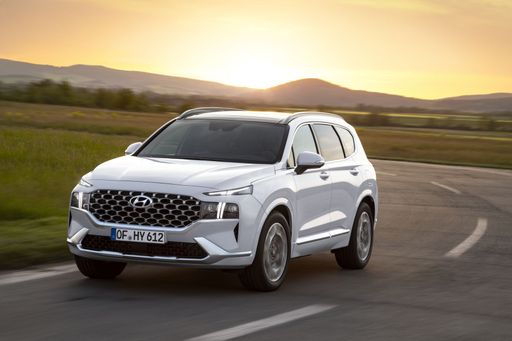 @ hyundai.news
@ hyundai.news
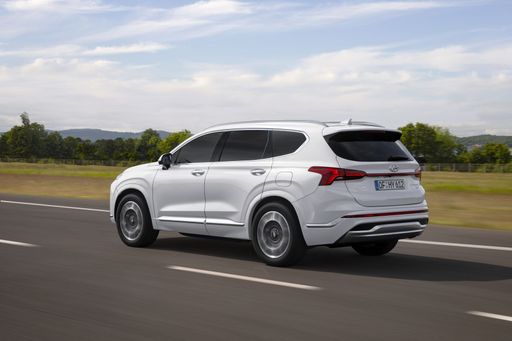 @ hyundai.news
@ hyundai.news
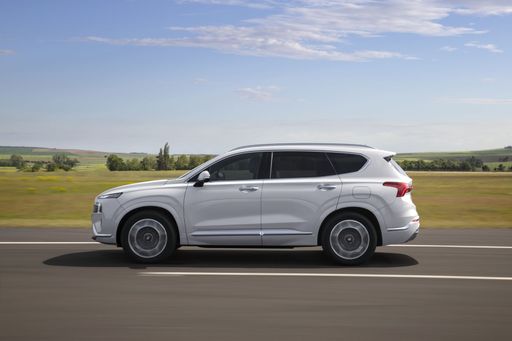 @ hyundai.news
@ hyundai.news
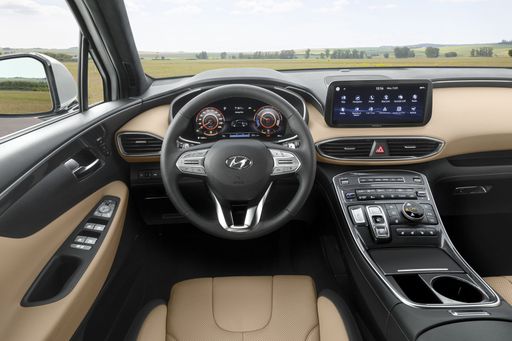 @ hyundai.news
@ hyundai.news
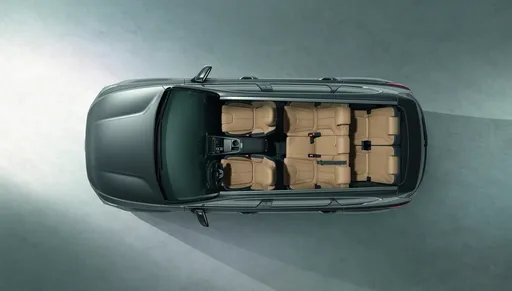 @ hyundai.news
@ hyundai.news
VW Transporter Transporter
The VW Transporter, a versatile favourite among commercial vehicles, combines practicality with modern design. Its spacious interior offers ample room for both passengers and cargo, making it a reliable choice for businesses and families alike. The vehicle's strong build and advanced technology ensure a smooth and efficient driving experience in various conditions.
details

|
|
|
|
|
Costs and Consumption |
|
|---|---|
|
Price
49000 - 58400 £
|
Price
37500 - 60800 £
|
|
Consumption L/100km
1.7 - 7 L
|
Consumption L/100km
7.1 - 8.4 L
|
|
Consumption kWh/100km
-
|
Consumption kWh/100km
21.9 - 24.4 kWh
|
|
Electric Range
54 km
|
Electric Range
56 - 331 km
|
|
Battery Capacity
-
|
Battery Capacity
11.8 - 63.8 kWh
|
|
co2
38 - 167 g/km
|
co2
0 - 220 g/km
|
|
Fuel tank capacity
47 - 67 L
|
Fuel tank capacity
55 L
|
Dimensions and Body |
|
|---|---|
|
Body Type
SUV
|
Body Type
Cargo Van
|
|
Seats
5 - 7
|
Seats
2 - 5
|
|
Doors
5
|
Doors
4 - 5
|
|
Curb weight
1920 - 2165 kg
|
Curb weight
1872 - 2462 kg
|
|
Trunk capacity
621 - 711 L
|
Trunk capacity
-
|
|
Length
4830 mm
|
Length
5050 - 5450 mm
|
|
Width
1900 mm
|
Width
2032 mm
|
|
Height
1720 mm
|
Height
1966 - 1985 mm
|
|
Payload
560 - 665 kg
|
Payload
755 - 1259 kg
|
Engine and Performance |
|
|---|---|
|
Engine Type
Full Hybrid, Plugin Hybrid
|
Engine Type
Diesel, Plugin Hybrid, Electric
|
|
Transmission
Automatic
|
Transmission
Manuel, Automatic
|
|
Transmission Detail
Automatikgetriebe
|
Transmission Detail
Manual Gearbox, Automatic Gearbox
|
|
Drive Type
Front-Wheel Drive, All-Wheel Drive
|
Drive Type
Front-Wheel Drive, All-Wheel Drive, Rear-Wheel Drive
|
|
Power HP
215 - 253 HP
|
Power HP
110 - 286 HP
|
|
Acceleration 0-100km/h
9.3 - 9.8 s
|
Acceleration 0-100km/h
7.4 - 16.9 s
|
|
Max Speed
180 km/h
|
Max Speed
112 - 150 km/h
|
|
Torque
367 Nm
|
Torque
310 - 415 Nm
|
|
Number of Cylinders
4
|
Number of Cylinders
4
|
|
Power kW
158 - 186 kW
|
Power kW
81 - 210 kW
|
|
Engine capacity
1598 cm3
|
Engine capacity
1996 - 2488 cm3
|
General |
|
|---|---|
|
Model Year
2024
|
Model Year
2025
|
|
CO2 Efficiency Class
E, F, B
|
CO2 Efficiency Class
G, A
|
|
Brand
Hyundai
|
Brand
VW
|
Hyundai Santa Fe
Discover the All-New Hyundai Santa Fe: A Blend of Performance and Innovation
The 2024 Hyundai Santa Fe is not just a step forward in technology; it's a leap. Combining style with substance, this SUV brings cutting-edge features to the road, promising exceptional performance and enhanced efficiency. Let's explore the new offerings of this impressive vehicle.
Powertrain and Efficiency Explained
The Hyundai Santa Fe is available with advanced hybrid and plug-in hybrid engines, offering an environmentally conscious approach without compromising on power. The hybrid variant, featuring a 1.6 T-GDI engine, delivers a respectable 215 PS, whereas the plug-in hybrid tops the range with 253 PS. Both options pair seamlessly with an automatic transmission, ensuring a smooth and efficient drive.
Fuel consumption has also been a focus, with the hybrid achieving rates as low as 6.4 L/100km, and the plug-in hybrid boasting an impressively low 1.7 L/100km. The latter also offers an all-electric range of up to 54 km, making it a practical choice for city driving.
Advanced Driving Experience
Hyundai has placed a strong emphasis on creating an engaging driving experience. With a maximum torque of 367 Nm, acceleration from 0-100 km/h is achieved in just under 10 seconds, providing a responsive and lively performance on all terrains. Front-wheel and all-wheel drive options ensure you have the flexibility to choose the setup that best suits your driving style.
Next-Level Safety and Convenience Features
The Santa Fe is packed with a suite of safety features designed to provide peace of mind. Hyundai's SmartSense technology includes forward collision warning, blind-spot monitoring, and a rear cross-traffic alert. These innovations ensure that every journey is as safe as it is enjoyable.
Convenience is not overlooked either, with a spacious interior offering seating configurations from 5 to 7 seats. The boot space ranges from 621 to 711 litres, making it ideal for family trips and those with an active lifestyle. The advanced infotainment system keeps you connected on the go, ensuring you have everything you need at your fingertips.
Stylish Design and Comfort
The Hyundai Santa Fe's refined design combines robust SUV aesthetics with modern elegance. Its dimensions — 4830 mm in length, 1900 mm in width, and 1720 mm in height — provide a commanding presence on the road. Premium material finishes and high-quality upholstery add to the luxurious feel of the cabin.
Unmatched Value for Money
With prices ranging from €56,700 to €68,150, the Santa Fe represents substantial value for the range of technology and luxury offered. Monthly running costs and efficiency also mean that the Hyundai Santa Fe provides long-term savings for the discerning consumer.
Suitable for any lifestyle, the new Hyundai Santa Fe is poised to capture the attention of SUV enthusiasts, combining performance, safety, and cutting-edge technology in a beautifully crafted package.
VW Transporter Transporter
Revolutionizing Utility: The VW Transporter T7
The latest iteration of the VW Transporter, known widely as the Transporter T7, marks a significant evolution in utility vehicle design and functionality. As a mainstay in the VW lineup, the Transporter T7 comes with a plethora of options, ensuring that it meets a variety of professional and personal needs.
Diverse Models to Fit Every Need
For 2025, the VW Transporter T7 is available in multiple configurations, ranging from efficient diesel engines to innovative hybrid systems. The conventional models are powered by a 2.0 TDI diesel engine, offering three power outputs: 110 HP, 150 HP, and a vigorous 204 HP. For those seeking a more sustainable option, the 2.5 eHybrid model provides a combined power output of 233 HP with an electric range of 56 km, thanks to its 11.8 kWh battery.
Innovative Technical Aspects
Underpinning the technical innovations of the Transporter T7 is VW's dedication to cutting-edge engineering. The diesel engines provide torque ranging from 310 Nm up to 390 Nm, ensuring robust performance across the lineup. Moreover, the T7 offers configurations with either manual or automatic gearboxes, catering to different driving preferences.
The availability of front-wheel drive and the 4MOTION all-wheel-drive system across the range enhances versatility, allowing the Transporter T7 to tackle various terrains with ease. With body lengths extending to 5450 mm and a payload capacity of up to 1259 kg, the Transporter T7 stands as a paragon of practicality for transporting goods or accommodating passengers.
Comfort and Design Revolution
Beyond performance, the VW Transporter T7 has been designed with driver comfort and ergonomic efficiency in mind. The cabins offer ample seating configurations, supporting both two-seat and five-seat layouts. The inclusion of modern conveniences elevates the driving experience, making long hauls more manageable and stress-free.
The exterior dimensions, with a width of 2032 mm and a height up to 1969 mm, marry the classic robust design with a contemporary touch, making the Transporter T7 a visual centerpiece in any fleet.
Economical and Environmental Impact
Economic efficiency is another critical aspect of the VW Transporter T7's design philosophy. With diesel fuel tank capacities between 55 and 63 liters, and an emphasis on improving mileage with each engine variant, operational costs are kept at a minimum. Additionally, the eHybrid model not only offers environmental benefits but also presents substantial savings on fuel through its electric range capability.
Conclusion: The Transporter T7 Legacy Continues
The VW Transporter T7 furthers the legacy of its predecessors by combining practicality, innovation, and eco-friendliness. Whether utilized for business in its cargo van capacity or adapted for personal use with seating comforts, the Transporter T7 is set to remain a critical player in the automotive sector, pushing the boundaries of what a multi-purpose van can achieve.
The prices and data displayed are estimates based on German list prices and may vary by country. This information is not legally binding.
